| Between the Devil | |
|---|---|
 Sheet music cover (cropped) | |
| Music | Arthur Schwartz |
| Lyrics | Howard Dietz |
| Book | Howard Dietz |
| Productions | 1937 Broadway |
Between the Devil is a musical comedy with book and lyrics by Howard Dietz and music by Arthur Schwartz.
| Between the Devil | |
|---|---|
 Sheet music cover (cropped) | |
| Music | Arthur Schwartz |
| Lyrics | Howard Dietz |
| Book | Howard Dietz |
| Productions | 1937 Broadway |
Between the Devil is a musical comedy with book and lyrics by Howard Dietz and music by Arthur Schwartz.
The musical opened in pre-Broadway tryouts in New Haven and Philadelphia in October 1937. The original plot had the leading man, Jack Buchanan, as an Englishman who married two women at the same time. The plot was changed to have Buchanan marry the second wife only because he thought his first wife had died. [1] Produced by Lee Shubert and J. J. Shubert, the Broadway production opened on December 22, 1937, at the Imperial Theatre and closed on March 12, 1938, after 93 performances. The production was staged by Hassard Short, the book was staged by John Hayden, and dances and principals' numbers were staged by Robert Alton. The cast starred Jack Buchanan as Peter Anthony and Pierre Antoine, Evelyn Laye as Natalie Rives, Adele Dixon as Claudette Gilbert, and Charles Walters as Freddie Hill.
The show was only a moderate success but introduced the songs "By Myself" and "Triplets", both of which were used 16 years later in the 1953 film, The Band Wagon , which also starred Buchanan. The song "By Myself" was also covered by Leonard Nimoy 14 years after the movie (and included on his second album Two Sides of Leonard Nimoy ) in 1968. It was also recorded by Polly Bergen in 1958.
Act I
| Act II
|
In The New York Times , reviewer Brooks Atkinson praised the performers, with Buchanan distinguishing himself in the solo 'By Myself', Miss Laye "still retains her ranking as a blonde goddess", and Miss Dixon "stimulating in a more earthly style of conquest". He wrote of the musical: "If it were not for the book, 'Beyond the Devil' would probably look and sound as frisky as it pretends to be. But, oh these bigamists! Oh, these wicked Parisian chanteuses! Oh, these improper situations! Oh!" [2]
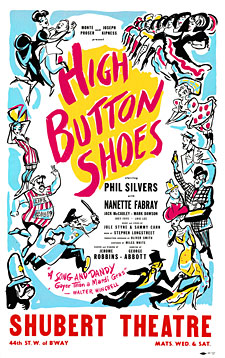
High Button Shoes is a 1947 musical with music by Jule Styne, lyrics by Sammy Cahn and book by George Abbott and Stephen Longstreet. It was based on the semi-autobiographical 1946 novel The Sisters Liked Them Handsome by Stephen Longstreet. The story concerns the comic entanglements of the Longstreet family with two con men in Atlantic City.

Guy Reginald Bolton was an Anglo-American playwright and writer of musical comedies. Born in England and educated in France and the US, he trained as an architect but turned to writing. Bolton preferred working in collaboration with others, principally the English writers P. G. Wodehouse and Fred Thompson, with whom he wrote 21 and 14 shows respectively, and the American playwright George Middleton, with whom he wrote ten shows. Among his other collaborators in Britain were George Grossmith Jr., Ian Hay and Weston and Lee. In the US, he worked with George and Ira Gershwin, Kalmar and Ruby and Oscar Hammerstein II.

Howard Dietz was an American publicist, lyricist, and librettist, best remembered for his songwriting collaboration with Arthur Schwartz.

Walter John Buchanan was a Scottish theatre and film actor, singer, dancer, producer and director. He was known for three decades as the embodiment of the debonair man-about-town in the tradition of George Grossmith Jr., and was described by The Times as "the last of the knuts." He is best known in America for his role in the classic Hollywood musical The Band Wagon in 1953.

The Imperial Theatre is a Broadway theater at 249 West 45th Street in the Theater District of Midtown Manhattan in New York City. Opened in 1923, the Imperial Theatre was designed by Herbert J. Krapp and was constructed for the Shubert brothers. It has 1,457 seats across two levels and is operated by The Shubert Organization. The auditorium interior is a New York City designated landmark.

Panama Hattie is a 1940 American musical with music and lyrics by Cole Porter and book by Herbert Fields and B. G. DeSylva. The musical is about a nightclub owner, Hattie Maloney, who lives in the Panama Canal Zone and ends up dealing with both romantic and military intrigue. The title is a play on words, referring to the popular Panama hat.

The Shubert Theatre is a Broadway theater at 225 West 44th Street in the Theater District of Midtown Manhattan in New York City. Opened in 1913, the theater was designed by Henry Beaumont Herts in the Italian Renaissance style and was built for the Shubert brothers. Lee and J. J. Shubert had named the theater in memory of their brother Sam S. Shubert, who died in an accident several years before the theater's opening. It has 1,502 seats across three levels and is operated by The Shubert Organization. The facade and interior are New York City landmarks.
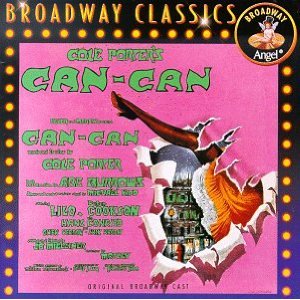
Can-Can is a musical with music and lyrics by Cole Porter, and a book by Abe Burrows. The story concerns the showgirls of the Montmartre dance halls during the 1890s.
Rosalie is a musical with music by George Gershwin and Sigmund Romberg, lyrics by Ira Gershwin and P.G. Wodehouse, and book by William Anthony McGuire and Guy Bolton. The story tells of a princess from a faraway land who comes to America and falls in love with a West Point Lieutenant.

Adele Dixon was an English actress and singer. She sang at the start of regular broadcasts of the BBC Television Service on 2 November 1936.

Out of This World is a musical with music and lyrics by Cole Porter, and the book by Dwight Taylor and Reginald Lawrence. The show, an adaptation of Plautus's comedy Amphitryon, first opened on Broadway in 1950.

The Morosco Theatre was a Broadway theatre near Times Square in New York City from 1917 to 1982. It housed many notable productions and its demolition, along with four adjacent theaters, was controversial.
Alive and Kicking is a musical revue with sketches by Ray Golden, I.A.L. Diamond, Henry Morgan, Jerome Chodorov, Joseph Stein, Will Glickman, John Murray, and Michael Stewart; music by Hal Borne, Irma Jurist, Sammy Fain, Hoagy Carmichael, Harold Rome, Sonny Burke, Leo Schumer, and Ray Golden; and lyrics by Paul Francis Webster, Ray Golden, Harold J. Rome, Leonard Gershe, Sid Kuller, and Michael Stewart.
Inside U.S.A. is a musical revue by Arthur Schwartz (music) and Howard Dietz (lyrics). It was loosely based on the book Inside U.S.A. by John Gunther. Sketches were written by Arnold M. Auerbach, Moss Hart, and Arnold B. Horwitt.
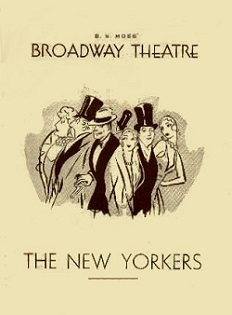
The New Yorkers is a musical written by Cole Porter and Herbert Fields (book). Star Jimmy Durante also wrote the words and music for the songs in which his character was featured.
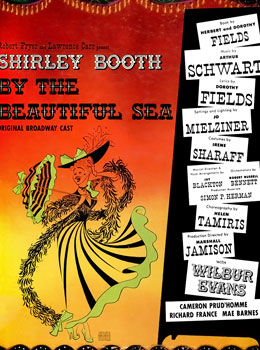
By the Beautiful Sea is a musical with a book by Herbert Fields and Dorothy Fields, lyrics by Dorothy Fields, and music by Arthur Schwartz. Like Schwartz's previous musical, A Tree Grows in Brooklyn, also starring Shirley Booth, the musical is set in Brooklyn just after the start of the 20th century (1907). By the Beautiful Sea played on Broadway in 1954.
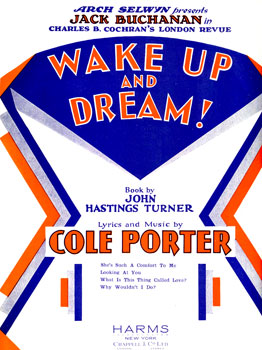
Wake Up and Dream is a musical revue with a book by John Hastings Turner and music and lyrics by Cole Porter and others. The most famous song from the revue is the Porter standard "What Is This Thing Called Love?"
Park Avenue is a musical with a book by George S. Kaufman and Nunnally Johnson, music by Arthur Schwartz and lyrics by Ira Gershwin. It was produced by Max Gordon with costumes by Tina Leser. The plot focused on the many divorces and marriages of the rich and "black tie" set. The production performed poorly and was Gershwin's last work for Broadway.
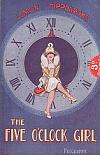
The Five O'Clock Girl is a musical with a book by Guy Bolton and Fred Thompson, music by Harry Ruby, and lyrics by Bert Kalmar. Set in New York City and South Hampton, Long Island, it focuses on wealthy Beekman Place playboy Gerald Brooks and impoverished shopgirl Patricia Brown, who become acquainted with each other via a series of anonymous five o'clock phone conversations.
Miss 1917 is a musical revue with a book by Guy Bolton and P. G. Wodehouse, music by Victor Herbert, Jerome Kern and others, and lyrics by Harry B. Smith, Otto Harbach, Henry Blossom and others. Made up of a string of vignettes, the show features songs from such musicals as The Wizard of Oz, Three Twins, Babes in Toyland, Ziegfeld Follies and The Belle of New York.